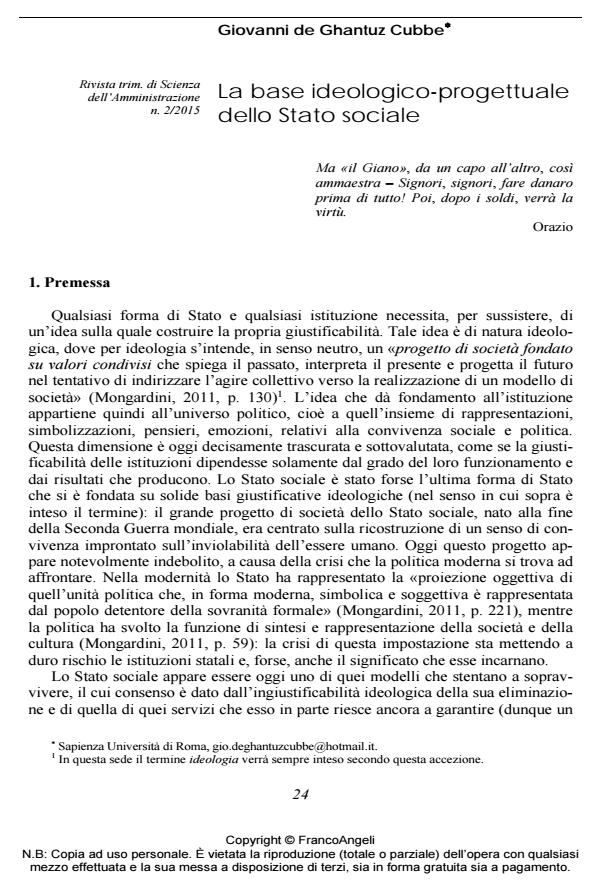The ideological and project-related side of the welfare state
Journal title RIVISTA TRIMESTRALE DI SCIENZA DELL’AMMINISTRAZIONE
Author/s Giovanni de Ghantuz Cubbe
Publishing Year 2015 Issue 2015/2
Language Italian Pages 15 P. 24-38 File size 82 KB
DOI 10.3280/SA2015-002002
DOI is like a bar code for intellectual property: to have more infomation
click here
Below, you can see the article first page
If you want to buy this article in PDF format, you can do it, following the instructions to buy download credits

FrancoAngeli is member of Publishers International Linking Association, Inc (PILA), a not-for-profit association which run the CrossRef service enabling links to and from online scholarly content.
The writer intends to underline the importance of ideologies, meant as "political, social and cultural projects". In this sense, ideologies are the roots of every form of State and institution. In particular, the writer focuses on the Welfare State, the last form of State which is grounded on politics as an activity projected to the future. Yet, the Welfare State is currently in decline. This essay analyzes this crisis and its different causes. These are: the strength of modern capitalism which overtakes politics; the current trends of markets and public policies towards privatization, the malfunctioning of public policies which usually affects the State, reducing its reliability. Moreover, the author believes that the main issue is the crisis of "meaning" behind the crisis of the institution itself. Any new significant and long term project, idea, ideology, model, is adopted to substitute that of the Welfare State. In conclusion, this essay begins with an analysis of a crisis and ends underlining the necessity not to interrupt - in the transition phases, in particular the one we are currently experiencing - the constant historic flow of thoughts, ideas, meanings, which avoid the lack of existential, cultural, social or political sense.
Keywords: Welfare state, social project, capitalism
- Angelini (2012). Costituzione ed economia al tempo della crisi. Rivista telematica giuridica dell’Associazione italiana dei costituzionalisti, 4.
- Associazione italiana dei costituzionalisti – Università degli Studi di Ferrara (1997). La costituzione economica. Atti del Convegno (Ferrara, 11-12 Ottobre 1991). Padova: CEDAM.
- Burdeau G. (1970). L’Etat. Paris: Éditions du Seuil (trad. it.: Lo Stato. Roma: La goliardica, 1982).
- Caretti P. e De Siervo U. (1992). Istituzioni di diritto pubblico. Torino: Giappichelli, 2010.
- De Felice R. (1969). Le interpretazioni del fascismo. Roma, Bari: GLF Laterza, 2012.
- Felisini D. (2010). Lo Stato e l’intervento pubblico. In: Fanfani T., a cura di, Storia economica. Milano: McGraw-Hill.
- Iannone R. (in corso di pubblicazione). Capitale e capitalismo: dalla descrizione alla critica. Santarcangelo di Romagna (RN): Maggioli.
- Menozzi D. (1997). La chiesa cattolica. In: Filoramo G. e Menozzi D., a cura di, Storia del cristianesimo: l’età contemporanea. Roma-Bari: GLF Laterza, 2009.
- Mongardini C. (2004). La società politica: appunti dalle lezioni di sicenza politica. Genova: ECIG. Vol. I.
- Mongardini C. (2007). Capitalismo e politica nell’era della globalizzazione. Milano: Franco Angeli.
- Mongardini C. (2011). Pensare la politica: per una analisi critica della politica contemporanea. Roma: Bulzoni. 10.1400/191639.
- Piketty T. (2013). Le capital au XXIe siècle. Paris: Éditions du Seuil (trad. it.: Il capitale nel XXI secolo. Milano: Bompiani, 2014).
- Pombeni P. (1998). La politica nell’Europa del ’900. Roma-Bari: GLF Laterza.
- Sabbatucci G. e Vidotto V. (2002). Storia contemporanea: il Novecento. Roma-Bari: GLF Laterza, 2012.
- Adorno T. e Horkheimer M. (1947). Dialektik der Aufklärung. Philosopische Fragmente (trad. it.: Dialettica dell’illuminismo. Torino: Einaudi, 2010).
Giovanni de Ghantuz Cubbe, La base ideologico-progettuale dello Stato sociale in "RIVISTA TRIMESTRALE DI SCIENZA DELL’AMMINISTRAZIONE" 2/2015, pp 24-38, DOI: 10.3280/SA2015-002002